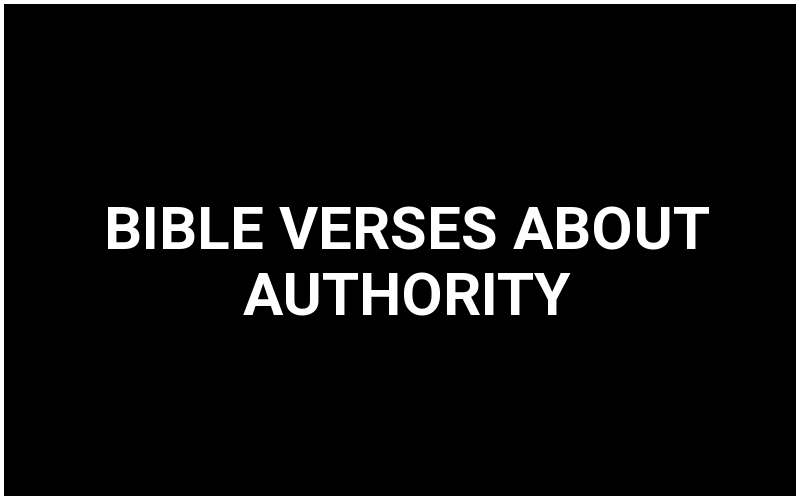Authority is an important theme in the Bible. It refers to the power and control that God gives to people in different roles, like leaders, teachers, and parents. Understanding authority helps us see how God wants us to behave and treat others. There are many Bible verses that teach us about the right way to use authority and respect those who have it.
Today, we will look at some key Bible verses about authority. These verses guide us on how to handle power in our lives and show us the importance of following God’s plan. Whether you’re a leader or someone who follows, these scriptures can help you understand your role in God’s kingdom.
Bible Verses About Authority
Authority Given by God
It is important to recognize that all authority ultimately comes from God. He establishes leaders in positions of power for a purpose. This reminds us that those we follow or respect in our lives have been placed in those positions by God’s plan. We are called to respect the authority given to others while always remembering it is God who grants that authority. With this understanding, we should approach the topic of authority with humility, knowing that we are all part of God’s grand design.
Romans 13:1
“Let everyone be subject to the governing authorities, for there is no authority except that which God has established. The authorities that exist have been established by God.” – Romans 13:1
1 Peter 2:13
“Submit yourselves for the Lord’s sake to every human authority: whether to the emperor, as the supreme authority.” – 1 Peter 2:13
Colossians 3:18
“Wives, submit yourselves to your husbands, as is fitting in the Lord.” – Colossians 3:18
Ephesians 4:11
“So Christ himself gave the apostles, the prophets, the evangelists, the pastors and teachers.” – Ephesians 4:11
Romans 12:8
“If it is to encourage, then give encouragement; if it is giving, then give generously; if it is to lead, do it diligently; if it is to show mercy, do it cheerfully.” – Romans 12:8
Respecting Authority
As followers of Christ, we are called to show respect to those in authority. This respect is not only for our leaders but also for those who guide us in various aspects of life. Respecting authority helps establish harmony and encourages unity within our communities. By honoring those in authority, we reflect our faith in God’s divine plan, showcasing the characteristics of Christ in our interactions. Let’s remember that respect opens doors to fruitful relationships.
Hebrews 13:17
“Have confidence in your leaders and submit to their authority, because they keep watch over you as those who must give an account. Do this so that their work will be a joy, not a burden, for that would be of no benefit to you.” – Hebrews 13:17
1 Timothy 2:1-2
“I urge, then, first of all, that petitions, prayers, intercession and thanksgiving be made for all people— for kings and all those in authority, that we may live peaceful and quiet lives in all godliness and holiness.” – 1 Timothy 2:1-2
Matthew 8:9
“For I myself am a man under authority, with soldiers under me. I tell this one, ‘Go,’ and he goes; and that one, ‘Come,’ and he comes. I say to my servant, ‘Do this,’ and he does it.” – Matthew 8:9
Titus 3:1
“Remind the people to be subject to rulers and authorities, to be obedient, to be ready to do whatever is good.” – Titus 3:1
Proverbs 24:21
“Fear the Lord and the king, my son, and do not join with the rebellious.” – Proverbs 24:21
Authority in the Family
The family unit is one of the most important structures that God has established, and each member has a role to fulfill. In this setting, authority is vital for maintaining order and nurturing growth. The Bible teaches us about the importance of leadership within families, urging us to approach these roles with love and kindness. This authority is meant to guide our families in faith while ensuring everyone feels valued and respected. We learn that healthy authority in the family can foster a strong sense of belonging.
Proverbs 22:6
“Start children off on the way they should go, and even when they are old they will not turn from it.” – Proverbs 22:6
Ephesians 6:1
“Children, obey your parents in the Lord, for this is right.” – Ephesians 6:1
Colossians 3:20
“Children, obey your parents in everything, for this pleases the Lord.” – Colossians 3:20
1 Timothy 5:8
“Anyone who does not provide for their relatives, and especially for their own household, has denied the faith and is worse than an unbeliever.” – 1 Timothy 5:8
Proverbs 1:8
“Listen, my son, to your father’s instruction and do not forsake your mother’s teaching.” – Proverbs 1:8
Authority in the Church
The church is another crucial place where authority plays an essential role. God has placed leaders within the church to shepherd His flock. This leadership is meant to guide us spiritually, bringing us closer to God. Respecting church authority allows us to support one another in faith, learning and growing collectively. When we honor our church leaders, we affirm their God-given responsibilities and encourage a healthy spiritual community.
Acts 20:28
“Keep watch over yourselves and all the flock of which the Holy Spirit has made you overseers. Be shepherds of the church of God, which he bought with his own blood.” – Acts 20:28
1 Thessalonians 5:12-13
“Now we ask you, brothers and sisters, to acknowledge those who work hard among you, who care for you in the Lord and who admonish you. Hold them in the highest regard in love because of their work. Live in peace with each other.” – 1 Thessalonians 5:12-13
Titus 1:5
“The reason I left you in Crete was that you might put in order what was left unfinished and appoint elders in every town, as I directed you.” – Titus 1:5
Hebrews 13:7
“Remember your leaders, who spoke the word of God to you. Consider the outcome of their way of life and imitate their faith.” – Hebrews 13:7
1 Peter 5:3
“Not lording it over those entrusted to you, but being examples to the flock.” – 1 Peter 5:3
Authority and Humility
The power of humility in relation to authority cannot be overstated. God calls us to be humble in our dealings with others, especially those we oversee. True authority, after all, comes with responsibility. By embracing humility, we can create an atmosphere where authority is seen as a service to others and not a means of control. This combination reminds us that we are all part of one body in Christ, called to lift each other up.
Philippians 2:3
“Do nothing out of selfish ambition or vain conceit. Rather, in humility value others above yourselves.” – Philippians 2:3
Luke 22:26
“But you are not to be like that. Instead, the greatest among you should be like the youngest, and the one who rules like the one who serves.” – Luke 22:26
James 4:10
“Humble yourselves before the Lord, and he will lift you up.” – James 4:10
Matthew 20:26-28
“Not so with you. Instead, whoever wants to become great among you must be your servant, and whoever wants to be first must be your slave.” – Matthew 20:26-28
1 Peter 5:5
“In the same way, you who are younger, submit yourselves to your elders. All of you, clothe yourselves with humility toward one another, because, ‘God opposes the proud but shows favor to the humble.'” – 1 Peter 5:5
The Burden of Authority
Holding authority comes with its share of burdens. Those in positions of power are often faced with complex decisions and challenges that weigh heavily upon them. The Bible reminds us that despite the pressures of authority, we are called to be responsible and faithful in our duties. This means seeking guidance from God, praying for wisdom, and remaining steadfast in our commitment to serve others. Our shared experiences of leadership and responsibility can inspire us to support those in authority.
Matthew 23:11-12
“The greatest among you will be your servant. For those who exalt themselves will be humbled, and those who humble themselves will be exalted.” – Matthew 23:11-12
James 3:1
“Not many of you should become teachers, my fellow believers, because you know that we who teach will be judged more strictly.” – James 3:1
2 Corinthians 5:20
“We are therefore Christ’s ambassadors, as though God were making his appeal through us. We implore you on Christ’s behalf: Be reconciled to God.” – 2 Corinthians 5:20
1 Thessalonians 5:14
“And we urge you, brothers and sisters, warn those who are idle and disruptive, encourage the disheartened, help the weak, be patient with everyone.” – 1 Thessalonians 5:14
Galatians 6:2
“Carry each other’s burdens, and in this way you will fulfill the law of Christ.” – Galatians 6:2
Leading with Love
Leadership carries the responsibility of showing love and compassion to those we lead. As followers of Christ, we are called to lead with our hearts. Authority should be exercised through love, understanding, and compassion rather than through coercion. When we approach authority with love, we create an environment where everyone feels included and valued. This leads to a strong community where all members experience the loving embrace of God’s family.
1 John 4:19
“We love because he first loved us.” – 1 John 4:19
John 13:34
“A new command I give you: Love one another. As I have loved you, so you must love one another.” – John 13:34
1 Peter 4:10
“Each of you should use whatever gift you have received to serve others, as faithful stewards of God’s grace in its various forms.” – 1 Peter 4:10
Mark 10:45
“For even the Son of Man did not come to be served, but to serve, and to give his life as a ransom for many.” – Mark 10:45
Romans 13:10
“Love does no harm to a neighbor. Therefore love is the fulfillment of the law.” – Romans 13:10
Final Thoughts
Authority is a vital part of our lives as we seek to fulfill our roles in God’s kingdom. We’ve explored how authority comes from God, the importance of respecting it, and the responsibility that comes with it. Whether we lead or submit, understanding our roles helps us live in harmony. We are reminded that our actions should be rooted in love, compassion, and humility. Through these principles, we can create communities that reflect the love of Christ.
As we continue on, let us remember to support our leaders, honor our responsibilities, and demonstrate love and respect in every interaction. God has a purpose in our authority, and understanding it brings us closer to His plan.
If you want to learn more, you might find it beneficial to read about leadership in the Bible or discover the importance of respect in our relationships. Each of these topics provides insights into how we can live out our faith in our daily lives.










